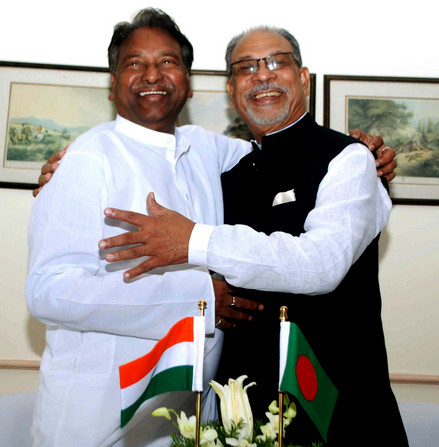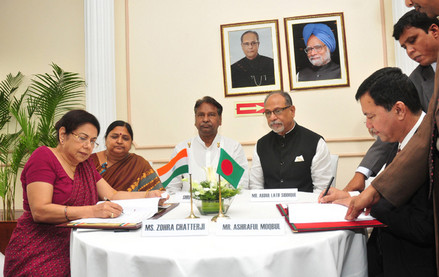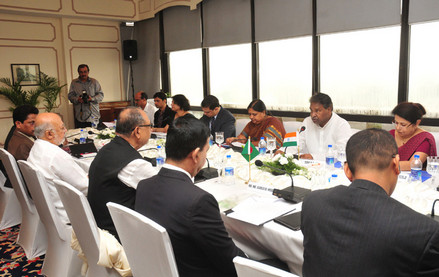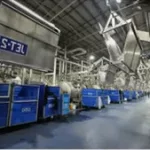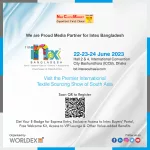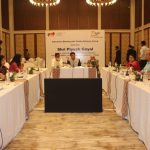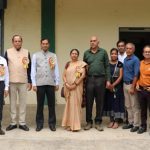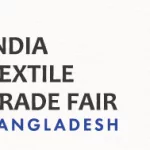Statement of Textiles Minister Dr. K.S.Rao at the Joint Press Conference with Mr. Abdul Latif Siddique, Minister of Textiles, Bangladesh
-
- India and Bangladesh have long shared a warm relationship. The bilateral meeting between India and Bangladesh has been reinforced in a number of bilateral meeting and visits in recent years. I would like to reiterate my deep commitment to a strong bilateral relationship in the textiles sector and friendly relations.
-
- The Minister of Textiles and Jute Government of Bangladesh and and I have discussed the gamut of textiles sector collaboration between India and Bangladesh. Our talks have been constructive, cordial and fruitful. The issues covered included enhancement of collaboration in textiles sector between the two countries by signing an MoU on Textiles sector collaboration, cotton security for Bangladesh textiles mills and the establishment of a successor organization for the International Jute Study Group in Dhaka through Joint efforts at the UNCTAD.
- India and Bangladesh have a long history in textiles sector. During the historic visit of the Prime Minister Dr. Manmohan Singh to Dhaka in September 2011, Textiles sector issues were amongst the major deliverables. The unilateral decision for duty free, quota free access of 48 textiles lines of Bangladesh readymade garments to India, withdrawal of countervailing duties from all jute products from Bangladesh to India, simplification of testing requirements on Jaamdani saris, review of marking and labeling requirements for jute bags, cotton and cotton yarn exports to Bangladesh were amongst the salient issues that have featured in the bilateral relationship.

The Secretary, Ministry of Textiles, Ms.Zohra Chatterjee and the Sr. Secretary, Textiles, Bangladesh, Mr. Ashraful Moqbul signing an MoU for cooperation in Textile sector, in the presence of the Union Minister for Textiles, Dr. Kavuru Sambasiva Rao, the Minister of Textiles Bangladesh, Mr. Abdul Latif Siddique and Minister of State for Petroleum & Natural Gas and Textiles, Smt. Panabaka Lakshmi.
- Subsequent to the Prime Minister’s visit, India has further brought down duties on all imports from Bangladesh under the SAFTA agreement. The will further enhance trade between our countries. India’s textile imports from Bangladesh in pursuance of the Prime Minister’s visit 2011 have increased from USD 164 million in 2010 to USD 271 million in 2011 and USD 289 million in 2012. In 2013, statistic indicate an increase of 15 percent over 2012. Imports are increasing in chapter 61, 62 and 63 which are apparel articles both knitted and woven and also in home textiles. I do hope that this strong performance trends in Bangladesh exports to India in textiles sector continue to develop in the coming years.
- In pursuance of the 2012 Commerce Secretary level talks following the Prime Minister’s visit of 2011, textiles sector issues continued to feature prominently in the bilateral relationship. This is only natural given that India and Bangladesh account for USD 50 billion dollars of textiles and apparel exports to the world and constructive engagement will take the industry in both countries forward. Two agreements were follow up – (a) the MoU on Textiles sector collaboration and (b) the Cotton Purchase Agreement. I am delighted that we have reached an agreement on the MoU on Textiles sector collaboration which has been signed by Secretary Textiles Government of India and Senior Secretary Textiles and Jute Government of Bangladesh following the bilateral meeting.
- The MoU on Textiles sector collaboration, would act as a major trade facilitation mechanism, by establishing and institutional mechanism for collaboration through a Joint Working Group. The Joint Working Group develop collaborations between the Textiles Institutions in the two countries- between the skill building institutions, fashion institutes and research institutions.
- As regards, the Cotton Purchase Agreement, the final drafts have been exchanged between the 3 sides. In 2013-14 cotton season, I have assured his Excellency that Bangladesh Textiles Mills would not have any difficulties in sourcing cotton from India.
- The other item that we discussed is the setting up of a successor organization to the International Jute Study Group whose term concludes in March 2014. India has in-principle agreed to support the Bangladesh initiative for a successor multilateral organization in Jute sector for taking forward the initiatives of the International Jute Study Group. We would also be willing to form a joint front with the Government of Bangladesh in requesting prospective member countries to support a proposal for forming a new organization as a successor to IJSG at UNCTAD, as and when the conference is convened on request of the initiating countries. The basic requirement to move a request to UNCTAD is that it should be moved by countries representing major share in the production and trade of the commodity (i.e. jute and allied fibers). India and Bangladesh produce above 90 percent of the world production of jute and allied fibers. On trade and importing countries like Turkey, China, Pakistan and others to give the organization a multinational look.
